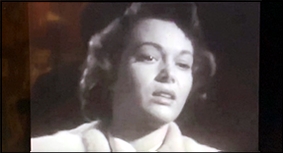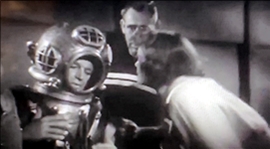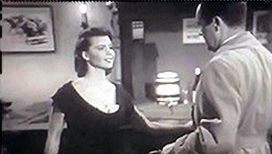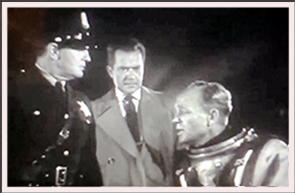Thu 17 Aug 2023
A TV Episode Review: FOUR STAR PLAYHOUSE “Search in the Night†(1953).
Posted by Steve under Old Time Radio , Reviews , TV Drama[10] Comments

FOUR STAR PLAYHOUSE. “Search in the Night.â€. CBS, 05 Nov 1953 (Season 2, Episode 7). Frank Lovejoy (Randy Stone), Frances Rafferty, James Millican, Rhys Williams, Vic Perrin, Colleen Miller. Directed by Christian Nyby. Current streaming on YouTube (see below).
“Search in the Night†features a reporter for the Chicago Star whose nightly beat takes him through the streets of that city after the sun goes down, looking for human interest stories to tell his reading audience in his next morning’s daily column. On this particular night, he comes a across a small crowd of people watching a man in a deep sea diver’s suit and helmet look for something off a short pier.
What is he looking for? Who us the woman who hired him? At the rate of $50 per dive, it must be something important. But … a woman’s purse? Randy Stone is puzzled, until the purse is opened. In it is $5000 in a small wad of bills. Also in the purse … a gun. Then the diver reveals something else. The body of man is also down there, caught in the pilings of the pier. Now Randy Stone has his story. But how does it develop from there? And more to the point, how does it end?

Old time radio fans will have recognized what is going on, almost immediately, I’m sure. This was an effort to transfer a highly successful radio show to TV. Night Beat was an NBC radio drama that was on the air from February 6, 1950 to September 25, 1952
Quoting from its Wikipedi page, “Frank Lovejoy starred as Randy Stone, a reporter who covered the night beat for the Chicago Star, encountering criminals, eccentrics, and troubled souls. Listeners were invited to join Stone as he ‘searches through the city for the strange stories waiting for him in the darkness.’â€

This “backdoor pilot†is a good one, filled with just the right amount of mystery and characters who are terrified about what comes next (some of them), while others feel safe as they go about go about their day-by-job, while revealing to Stone what led up to the events he wandered into in the middle of.
As a pilot, this really ought to have been picked up. On radio, Frank Lovejoy’ gruff but yet kindly voice was perfect for the role. On TV, his square-jawed visual persona fit the role to a tee, and his interactions with the people he encounters and talks to are also finely tuned. (And not all of them are essential to the plot. His encounter with Colleen Miller’s character as a floozie in a bar, for example, lasts no more than a minute or so, but the conversation they have is solid gold.)

August 18th, 2023 at 10:29 am
I remember Night Beat well, I was eleven when it went on the air, never missed it, and became an admirer of Lovejoy. I wanted the television series to take off, but Lovejoy and television did not happen. Four Star, which means three stars one of whom, Dick Powell, the soul, also did a pilot of Meet McGraw, perhaps several of them, but they did not happen.
August 18th, 2023 at 7:16 pm
We are about the same age but at the time NIGHT BEAT was on, I was still listening to BOBBY BENSON, STRAIGHT ARROW and THE CISCO KID. I didn’t catch up to NIGHT BEAT until the 1970s and reel to reel tapes on the collectors’ market.
The series had a distinctive feel and almost noirish flavor to it that I thought this TV pilot captured very very well.
August 18th, 2023 at 7:22 pm
Here’s a pilot for MEET McGRAW that I found online, this one starring Frank Lovejoy, and also on FOUR STAR PLAYHOUSE. The good news with this one is that it actually led to a series. Haven’t watched it yet, but I will:
August 18th, 2023 at 7:28 pm
And here’s what’s described as a second attempt at a NIGHT BEAT pilot. The person who uploaded it to You Tube says:
“”A Study in Panic” was Four Star Productions’ second outing with the characters and situations originally created for the NBC radio drama NIGHT BEAT. But where Four Star first attempted to do a straight-forward television adaption of the series in 1953, this 1954 effort was more of a re-invention. The name of its protagonist was changed to Fred Jordon, and he was portrayed by Dick Powell (rather than Frank Lovejoy). His newspaper column was no longer “Night Beat,” but “City After Dark.” Yet, despite the cosmetic changes, “A Study in Panic” is still recognizable as a NIGHT BEAT story (with a script directly adapted for television from the 1951 NB episode “Fear”). “A Study in Panic” aired as the April 8, 1954 installment of FOUR STAR PLAYHOUSE. Whether it was intended as a pilot for a potential series, or simply a stand-alone episode, is unclear. But it is clearly NIGHT BEAT’s second foray into the world of television.”
August 18th, 2023 at 9:20 pm
Was it here or on Patti’s blog that I mentioned catching “Search in the Night” fairly randomly on a RetroTV rerun (as they do weekdaily) of FOUR STAR PLAYHOUSE…as I may or may not have mentioned, I’d caught up with NIGHT BEAT on THE BIG BROADCAST block of vintage (mostly) radio drama on WAMU on Sunday nights, streaming it on occasion since moving away from the DC area in ’96 (having lived there since ’84, and having had a radio series, SWEET FREEDOM natch, up against it for a few years!) And FOUR STAR had four stars a fair amount of the time, but definitely not for the whole run…albeit also not the Same Four…
August 19th, 2023 at 12:31 am
The original four stars were Dick Powell, Charles Boyer, David Niven, and Ida Lupino, but as you say, it was the fourth star that varied, depending on who the lead actor was in that night’s play, not always Ms Lupino.
August 18th, 2023 at 9:49 pm
Steve,
Dick Powell rather than Frank Lovejoy sells it. I listened to the shows you mentioned, plus
Superman, Tom Mix, and most important of all, The Green Hornet and his uncle, The Lone Ranger,both of which I avoided on television. Same with Superman.
August 18th, 2023 at 9:56 pm
I wonder if the hour-long length of the pilot had anything to do with its failure. I can see it working much better in a half hour format.
NIGHT BEAT seems like a natural for a series, but perhaps it was already getting too late to be drawing from radio in 1953.
August 18th, 2023 at 11:24 pm
The Fugitive, 77 Sunset Strip, The FBI, and others worked well hourlong. I think Night Beat was tired, and that was its strength on radio, but exhaustion did not translate well on television and woujdl not have as a motion picture.
August 19th, 2023 at 12:24 am
No, you’re right. Taking this as an example, and the radio shows I cstill remember, NIGHT BEAT would work only as 30 minute episodes. An hour show would wear out its welcome fast.